Your login information returned multiple users. Please select the user you would like to log in as and re-type in your password.
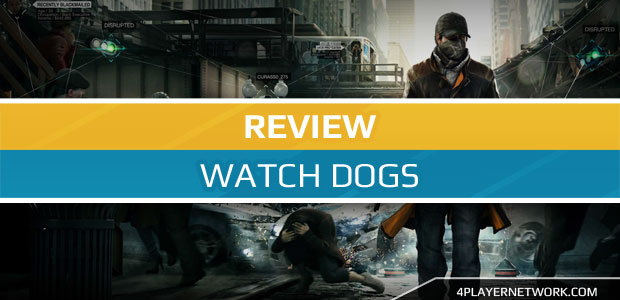
As it has always been, when one generation of consoles transitions into another we are presented with what appear to be fresh ideas underneath of sheen of unparalleled graphical fidelity. Put into development at a time in which the old system’s potential has all but been tapped out, these titles are our first glimpses into the future of what a new console generation is capable of. More often than not however, many of these concepts that serve as transitional titles fail to meet their target in both the eyes of their makers as well as the public itself, drawing ire from all sides regardless of how the final product presents itself.
Watch Dogs is one such victim of this rather unfortunately situation. While its initial reveal at E3 2012 drew amazed looks from all around. The diligent and steadfast among us however still remember what Killzone 2 was supposed to be though. Ubisoft’s darling new IP has been the subject of great anticipation and yet, also great trepidation in the months leading up to release. Could it really meet the expectations of a demanding gaming public that wishes to see their $400 consoles put to full use? Can this new series capture the sweeping narrative potential Assassin’s Creed has tried to garner over the past seven years? Does Watch Dogs mark the beginning of a bright future for this new generation or is it simply a last gen hack job?
Publisher: Ubisoft
Release date: May 27, 2014
Platform(s): Xbox One (Reviewed), PS4, PC, PS3, Xbox 360
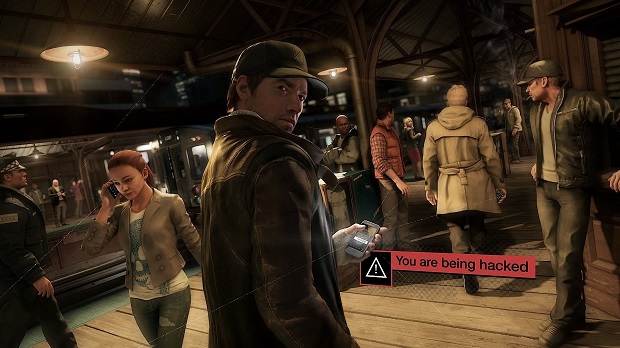
Interconnected Lives, Re-Routed
Chicago is one of the most storied cities in the United States, though the most popular bits of its history do not come from something to be proud of. The greatest of these stories hail from the 1920s in which mobsters like Al Capone ruled the streets through fear and intimidation. Despite having wished otherwise, Chicago remains one of the most dangerous cities in North America to this day. In Watch Dogs, Chicago’s government has a new weapon for a new age: the Central Operating System. A city-scale network of mainframes, the CtOS controls most of the infrastructure of Chicago, from street lights to water pumps, electricity to emergency services, all built on a vast grid of surveillance cameras placed specifically to combat crime. It’s a wet dream for the NSA but at its heart lies a dark secret: its true potential as a monitoring system that manipulates our lives and sees everything we do.
Thought impenetrable, the CtOS is a vulnerable system that has been long-since hacked. An anonymous hacker collective known as DedSec tries to warn the public of the threat the system holds for its citizens while tech-savy gangsters access its weak points to further their own ends. In the middle stand Fixers, mercenaries that can bend the CtOS to their will using advanced hacking tools at the behest of the highest bidder. Aiden Pierce, our hero, is one such Fixer.
On a typical night in 2012, Aiden and his partner, Damien, infiltrate the Merlaut Hotel on a routine money-syphoning heist. In the middle of the job another hacker appears and penetrates the same network, exposing the two. Pierce is identified by an unknown group who put out a hit on him, resulting in the death of his niece, Lena, during the ensuing attempt on his life. Grief-stricken, Aiden makes it his life’s mission to protect his remaining family and punish those responsible.
Watch Dogs has many expectations placed upon it, one of the most important being its story. After being billed as the next great IP for a new generation, much like Assassin’s Creed was supposed to be last generation, one should expect something of a sweeping narrative that challenges your perception of an aspect of everyday life. For Assassin’s Creed, it was the manipulation of history and the control of public perception built against the backdrop of a hidden war that has been waged for thousands of years. Watch Dogs should then, ideally, be about information warfare and one man’s quest to be a guardian of the people.
What we get is only halfway to this narrative goal. Aiden Pierce’s story aims to take a trip down the digital rabbit hole in a quest to get vengeance for his niece but it never really gets to that point with any flair or excitement. While the story does come full circle and resolves almost all plot elements (some are left purposefully unresolved more than likely for DLC or sequel purposes), it doesn’t particularly do so in an enjoyable manner.
The problems with the overall plot is twofold: the characters themselves and the manner in which the story is presented. Aiden Pierce’s unique character abilities (ie. the manipulation of the CtOS) as well as his plot situation has the potential to make him into a great vigilante hero but instead of fleshing him out he becomes all but one-dimensional. Occasionally he will reminisce about his actions and whether he is morally justified in committing them but once that fifteen second moment passes, we’re back on the street being chased by the police, hacking into people’s lives and taking on hordes of gangsters. Similarly, the rest of the Watch Dogs cast rarely show all that much emotion or character development to put them even in the vicinity of being memorable. Considering the background for the overall conflict present in the game, it’s reasonable to expect at least some of the characters to take a ride on a moral rollercoaster but most of the deliveries are actually quite flat.
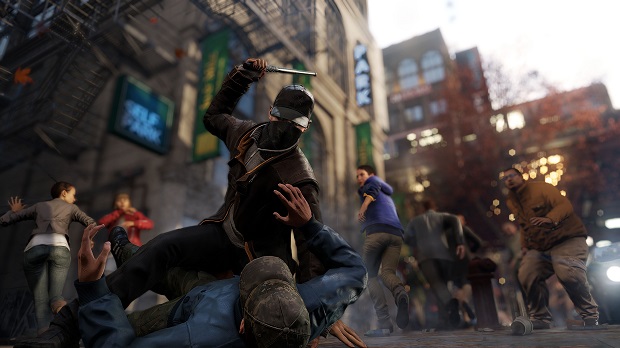
The other problem resides in just how Ubisoft chose to present the game’s story. While the game does fairly well at linking consecutive events together, that’s mainly how the story as a whole plays out. The game begins in media res, showing us a two minutes of cutscenes for the prologue before jumping forward nearly a year later without really addressing the consequences of what we just saw. It’s unreasonable to expect the audience to establish a relationship with our main character if we’re thrown smack dab in the middle of a revenge story and while I appreciate some of Aiden’s motivation, there remains a significant disconnect. In addition, Watch Dogs chooses to ignore characters once their arc has been completed, leaving some to unknown fates while at the same time never establishing more of Pierce’s personality outside of intro/outro mission cutscenes. It’s very dry, making it clear that this is a game far more motivated by gameplay than story. If Ubisoft intends to make this into a series, it would be in their best interest to rectify this.
Analog Warfare for the Digital Age
At its heart, Watch Dogs is very much a typical sandbox crime drama game focused on a uniquely powerful character of unquestionable tactical fortitude. Players will explore a vast city environment filled to the brim with police, gangsters and everyone else caught in between. The selling twist that attempts to separate his new title from being yet another Grand Theft Auto clone is Aiden Pierce’s Fixer abilities which allow him almost unprecedented control over his digitally-powered environment.
Throughout the Watch Dogs experience, Aiden is given the ability to manipulate many of the machine run elements throughout the environment. Utilizing their access to the CtOS, players can control much of the infrastructure of Chicago such as traffic lights, bridge controls and various electrical utilities. These tools, while usable at almost any given time in the game, are best utilized contextually in terms of what’s going on around you. While sure, you can use the CtOS to terrorize the city by causing traffic jams, black outs and electrical explosions, they are far more useful when you use them against the gangs or cops that chase you throughout the Windy City’s streets.
The most common tool players will utilize during their time in Chicago is the Profiler, an app on Aiden’s phone that analyzes the NPCs in the environment and returns information about them. As a human being, it’s only natural to want to delve into a person’s innermost secrets and this itch can be scratched very easily and frequently throughout the game by simply walking down the street with the Profiler activated. At the same time, many of the NPCs in the environment have exploitable links that can be hacked into. Many of them will allow you to hack into the bank accounts that you can withdraw cash from at any ATM, listen in on a private conversation or perhaps gain new information on criminal activities. It’s a fun and simple mechanic that is all but required for many missions in the game but if you enjoyed using it as much as I have, you will not mind at all.
Outside of the core story missions that appear in the game, Watch Dogs offers a variety of side quests and standalone missions that become progressively more available as the game continues. Fixer Contracts will task you to drive a car from one side of the city to the other while completing various objectives. Gang Hideouts assign you to infiltrate a fortress and take down the head honcho, Criminal Convoys have you trying to stop a target vehicle from reaching its destination and so on and so forth. Over time, new linked quests appear that have you taking on human trafficking rings and gun runners and, for the most part, these are fun little diversions. That being said, Watch Dogs also has a huge amount of collectibles in the world that give you further insight into the game’s background characters in the form of everybody’s favorite exposition format, audio logs. Honestly, most of the collectibles aren’t worth your time and unless you’ve been diagnosed with obsessive compulsive disorder, they should be skipped.
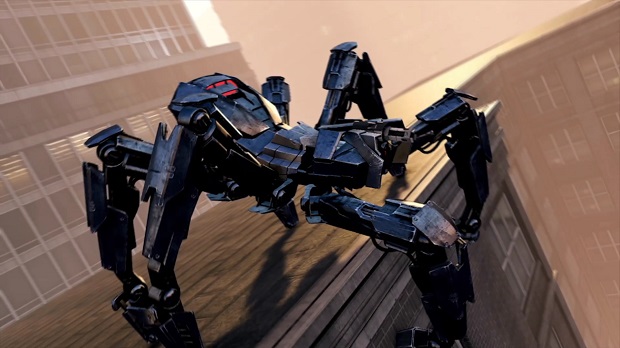
Digital Trips are easily the best side-mission highlight to be found in Watch Dogs. Much like the underutilized drugging sequences seen only a handful of times throughout Far Cry 3, these electronic-based trips serve as minigames that are a very enjoyable diversion from everything else found throughout the game. One trip has you taking the controls of a giant mechanical spider tank has you climbing buildings and wreaking havoc on the streets to rack up as much points as possible. Another features you sneaking through the dark, hiding from robots that kill you on sight while yet another has Aiden driving a Mad Max-esque armored muscle car through a Chicago hellscape running over demons and completing objective on a time limit. Everything to be had here is quite fun and should definitely be one of the first things you experience during your time with the game.
One of the more anticipated aspects of the game is the random nature by which events can happen in the game, specifically how crimes can seemingly occur out of nowhere. While these events can happen without notice, the CtOS will frequently identify pending crimes that occur proximate to Aiden’s location. The player, should they choose, can visit the area and utilize the Profiler to identify the victim and his or her aggressor. Strangely though, Watch Dogs forces you to actually wait until the crime is in progress rather than prevent it from happening entirely, eventually leading even the most prepared players into a foot chase if they choose to go in for the non-lethal takedown. Unlike the rather slick presentation of such events we received in February of last year, these foot chases usually devolve into running down a sidewalk for a considerable amount of time as there are only occasional CtOS tools like junction boxes or circuit breakers that can impede the NPC’s movement. Given this and the fact that Aiden cannot outpace any NPC in the world, the result is a chase that can last several minutes that is a drag rather than exhilarating, eventually making these missions something you want to avoid.
The random crime system is only the start of a variety of design choices that are either questionable or entirely missing. Seemingly to emphasize the CtOS system, Watch Dogs does not allow the player to fire a weapon while driving a vehicle, a staple of almost every crime-based sandbox title on the market. In addition, oddities begin to appear when you take a look at how the game’s background elements work. Bus stops are littered throughout Chicago with people waiting patiently for their ride to arrive and yet there is not a single bus to be found in the game. Motorcycles can be quite easily found in the environment and yet none of the NPCs in the game (other than in one of the opening cutscenes) ever actually drive one. In addition, the game does not feature a proper melee combat system save for a one-press takedown maneuver, instead forcing you to rely on your weaponry and the CtOS during a firefight. These and several more confusing or omitted design choices appear throughout the game and while they don’t necessarily detract from the overall experience, it certainly doesn’t add to it.
Watch Dogs certainly wants to keep you entertained with its content but it doesn’t seem competent in allowing the player to experience things as you want to. In addition to hundreds of collectibles and things to find, the game insists on informing you about things that are happening throughout Chicago whether you like it or not. Rarely will the game give you five minutes of peace without informing you about a new crime that is about to occur, new contracts that are available for the taking or news bulletins that either tell you about long outdated events that you were involved in or Aiden’s current status in the eyes of the public. Sometimes I just want to explore the city, Ubisoft, give me a break.
As seems to be the growing trend for crime-based sandbox titles these days, Watch Dogs incorporates several different RPG elements such as a morality system in order to flesh out the main character beyond his bland story background. Known as the Vigilante, Aiden has the ability to alter public perception of him based on his good or evil actions. Rescuing civilians from crimes such as what I described above will earn you good karma while tear-assing down the streets and gunning down citizens will cause this to drop into the negatives quite fast. Despite the possibilities that could come from having access to the CtOS and the constant reminders of public opinion polls regarding your status in Chicago, it’s disappointing to report that the only effect the morality system has is on how frequently the police will be called on you.
A morality system isn’t the only RPG element that Watch Dogs includes however. Skill trees gate access to hacking upgrades and various parts of the CtOS infrastructure while other trees can enhance Aiden’s combat, driving and crafting abilities. Players can also craft one-off tools that aid Aiden as you see fit. Having trouble sneaking past a bunch of guards? Cause a blackout to the area and sneak past them while in the dark. Is the enemy calling for reinforcements after spotting you? Use a communications jammer to prevent the call from going through. These tools can be crafted on the fly from the game’s weapon wheel using components and chemicals found throughout the environment and they are exceptionally useful.
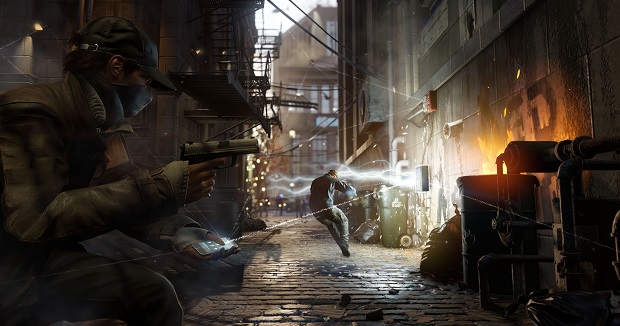
Apart from Watch Dogs’ core gameplay, Ubisoft has included online multiplayer that, in many instances, takes inspiration from Japanese developer From Software’s famous Souls series. While the game does feature the standard allotment of sandbox multiplayer modes such as free roam, racing and objective-based team combat, the invasion mechanic from the Souls series makes an appearance to a delightful degree. In Online Hacking, one player invades another’s world, appearing always as an NPC to the opponent but always as Aiden to themselves. In this Turing Test mode, one player attempts to hack the other by hiding within a certain radius while the victim attempts to hunt them down using the Profiler. If the aggressor is identified, they must retreat as they are not allowed to kill the target. Online Hacking is incredible fun and, as it can happen at almost any time outside of a mission, players should always be on guard for an invading Fixer. Sadly, the launch of Watch Dogs has been a bit tumultuous as excessive wait times for invasion attempts can quite often lead to failed connections. This, coupled with it being quite hard to locate a lucrative contract, will try the player’s patience. Interested players should take note, however, that while you can turn off the invasion mechanic, the game will reset your in-game notoriety, forcing you to build it back up once you turn it back on. It becomes a decision then: play with it on and expect to engage in multiplayer or turn it off and never do so for as long as you play.
The Cyber Frontier
As one of the first confirmed next generation games presented in 2012, Watch Dogs bore the distinction of being one of the visual powerhouses that would lead us into a bright future of graphical fidelity. As has been purported since late last year, the final product only contains a portion of the visual package that was presented to the public at E3 2012. Aside the visual effects, everything from texture models to environmental detail, animations to in-game physics are nowhere near the quality that we saw two years ago. While the package we have is still visually entertaining, the results are still disappointing by comparison.
One thing the game really has going for it is world depth though. Exploring Chicago, the city seems far more alive than Grand Theft Auto or many of its counterparts have ever done before. While not specifically a simulation experience nor having large numbers of NPCs on screen at any given time, almost every area in the game seems fleshed out and thoughtfully made. While not on the same level of authenticity that LA Noire presented, Watch Dogs seems to have done a very nice job on recreating a gameified version of Chicago so I must tip them my hat for doing so.
Watch Dogs doesn’t just seem like a visual downgrade because of these elements though as it is riddled with bugs and inconsistencies. Cutscene facial animations are par for the course but their appearance in-game is simply mouths moving opening and closing, nothing more. Some cars feature real-time world reflections on their windows but many buildings reflect a static, non-existent road and none of the character, car or background models actually present. Visual pop-in of spawning objects in the environment is very noticeable at times and can often get you killed for seemingly no reason at all. Failed transitions between two player’s worlds result in almost all objects and NPCs local to you getting despawned, only respawning when you turn the camera away from them. Some of these things may seem quite arbitrary but revealing only in the leadup to launch the actual visual content of the game is at the least being deceptive to your audience and, at most, false advertising. Activision learned lesson their about this in 2006 with the marketing for Call of Duty 2. Perhaps Ubisoft needs to take a look at what happened then and give The Division some more time in the oven.
In the audio department, what we get is once again a mixed bag. The game’s voice acting certainly has potential (a performance by Christopher Jacot is quite nicely done) but Noam Jenkins, who plays Aiden Pierce, doesn’t even come close to the presentation Brian Bloom brought to BJ Blazkowicz. Man, that’s a comparison I never thought I’d type. It doesn’t help that most of the game’s script is missing a hefty amount of raw emotion or depth. You can’t make an audience care about a character when only their words convey who they are and it seems that the core team that worked on Watch Dogs didn’t get that memo. Perhaps they should go next door and take some notes from the Assassin’s Creed team.
The rest of the audio presentation is fairly well done though. Sound effects can come across quite raw and visceral at times with traffic collisions providing a very suite of metal upon metal crunching and grating against one another. Strangely though, the audio for certain effects such as the roar of an engine can suddenly be quietened or disappear altogether for some unknown reason. Watch Dogs’ soundtrack features a mostly digital or synth presentation with occasional orchestra elements thrown into the mix. However, the soundtrack is mostly subdued and doesn’t really build any momentum except at only a few key moments throughout the game. It’s good when it really wants to be but when you find yourself roaming the streets of Chicago just for the sake of doing so, it all but abandons you.
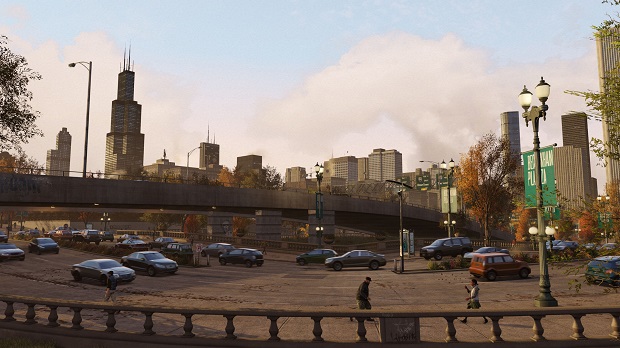
Watching the Watchers
Watch Dogs is a game of many contradictions. It wants to be a great story experience but it’s hampered by uninteresting characters and a disappointing presentation style. It wants to be a great sandbox game but trades in staple design elements of the genre for player-controlled environment manipulation when they could all certainly live in harmony. The online multiplayer can be rather fantastic to play but only when it wants to work. The presentation is nice but is two steps down from the fidelity and presentation we got at E3 2012.
Watch Dogs as a series certainly has potential. It introduces several interesting ideas to a genre that doesn’t see all that much innovation anymore. However, it should also stand as a cautionary tale on overselling a product. It’s certainly worth experiencing if you go into it with an open mind but if you’ve been following its development over the past two years, steel yourself for being left in the dark to howl at the moon.
Final Score: 6/10
(60-69%: Good - You’ll find some serious or distracting issues.)
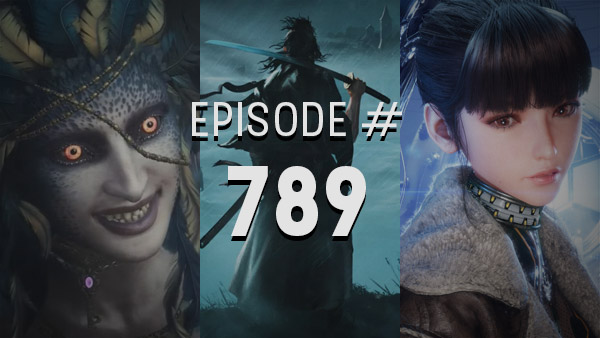
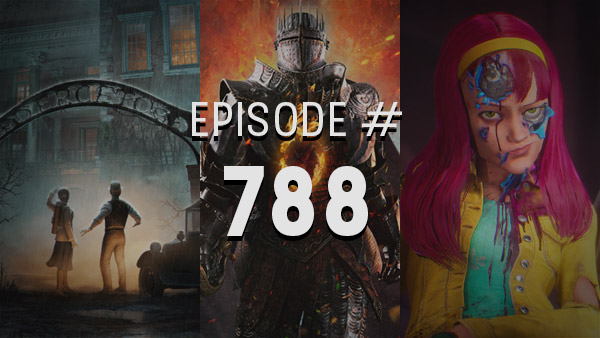
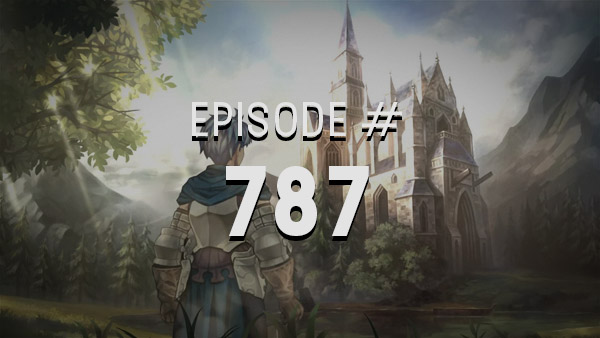
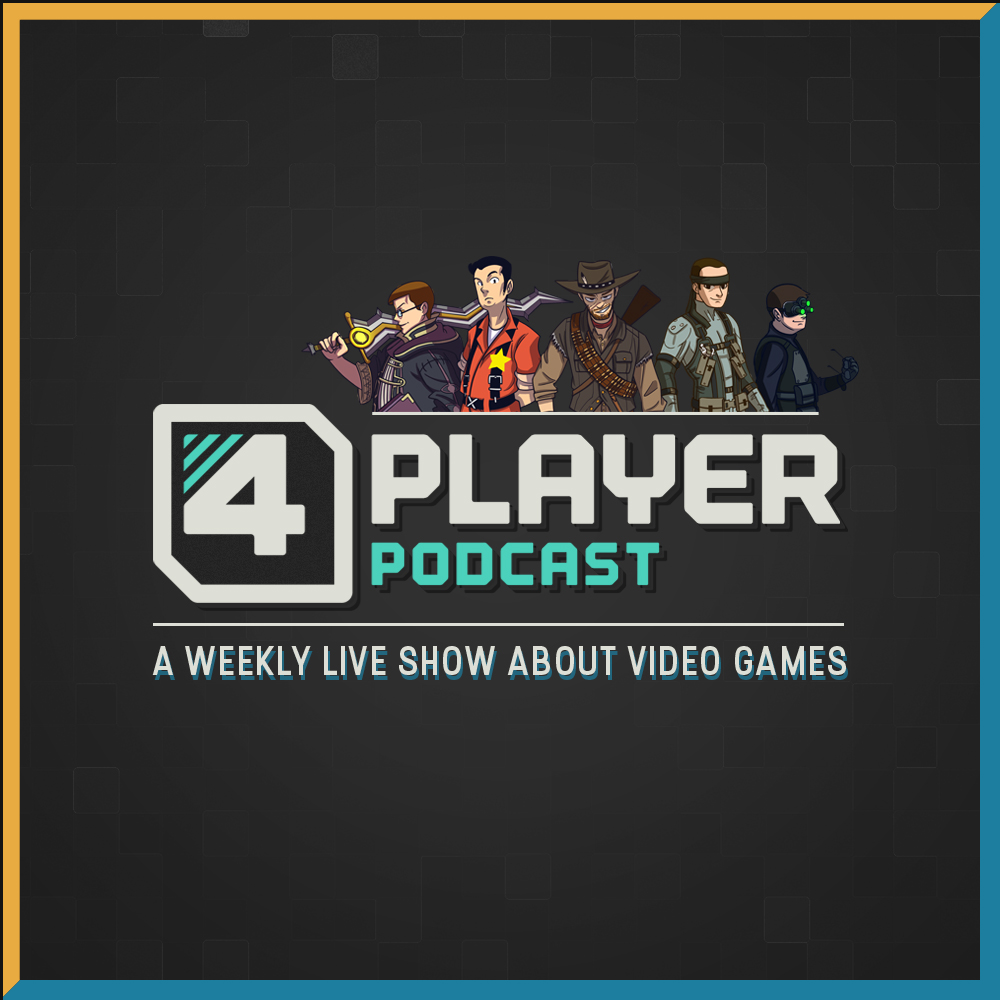
Comments
9 years, 10 months ago
Good article, Chris. Oddly enough, I never bought any of the hype for this game, and I'm sorta glad I didn't.
Under "Cyber Frontier" you made an error in the sentence "Activision learned their about this lesson in 2006 with the marketing for Call of Duty 2". Might wanna fix that. Just saying.
9 years, 10 months ago
I have been debating whether to get this game for a while now but I agree that there are some technical flaws and I hope they fix these next time around (or in a patch). Great article :D
9 years, 10 months ago
I think this is one of those games where the slate is blank or rather bland and it's then up to the player to determine what experience they have. Not saying this is how games should be, but as long as the toys are there then imagination can take over.
When we saw this game at E3, I thought Aiden would be some hacker dude who got wrapped up in this world with some vulnerability and not a criminal per say.
9 years, 10 months ago
I gotta agree with Chris. The game has its problems, but the hacking is where the game shines. Whether it be in the single player or hacking players online, it can be really satisfying. The rest of the game needs some work and hopefully Ubisoft will do just that with the inevitable next title.
Also on the topic of not being able to drive and shoot. What's also infuriating is that you can't blind fire behind cover or hip fire. C'mon now Ubisoft.
9 years, 10 months ago
Great review Chris. During my play through of Watchdogs I found myself struggling to stay engaged. I almost stopped playing 3/4 of the way through and had to force myself to keep playing. Something about Aiden as a character didn't click with me; which to me is very important especially in such a long story based game. The gameplay on the other hand was pretty good. Towards the end of the game it felt awesome to be an overpowered hacker causing havoc in Chicago. In the end I can say I'm glad I finished it.
9 years, 10 months ago
Great review and there was really good discussion on the podcast about the game as well. Overall this is a game I will pick up some day - probably when it is around $20-30 on Steam. I've seen some game play, I like some concepts and appeals to emotion that were tried. It looks fun to just mess with things and fiddle around. Overall though the game looks just like what I felt with Saint's Row 4 - it has a cool concept, you get a lot of power and it's fun... It just isn't "new" enough to justify a full price purchase from me. What is even more odd is that if this were Sleeping Dogs 2 I would probably be all over it... This game just didn't get the characterization right or the atmosphere - it's just too open.
9 years, 10 months ago
Well i'll be getting this game for free and it seems like a decent game to help get through the summer drought.
Also great review Chris.